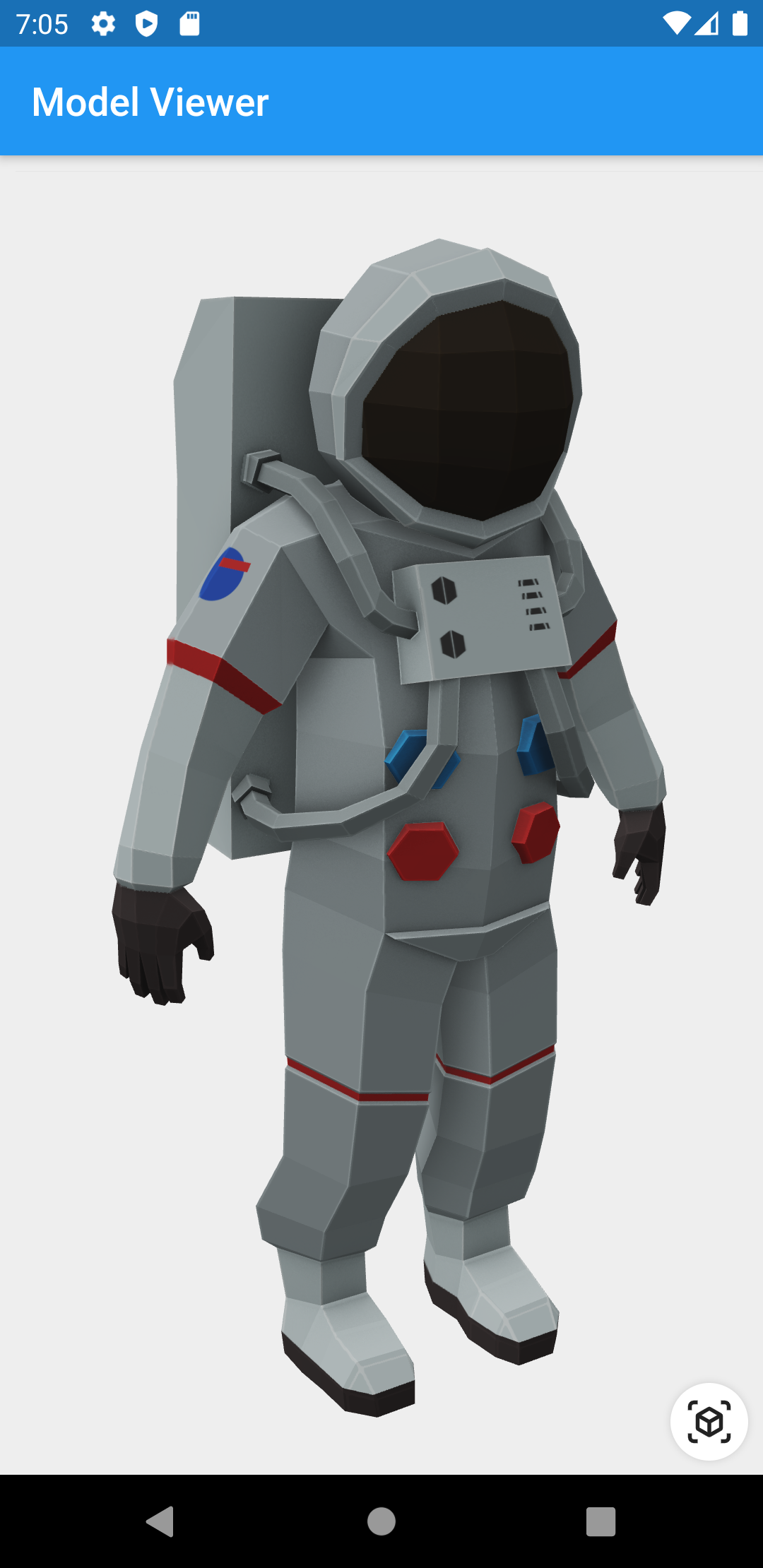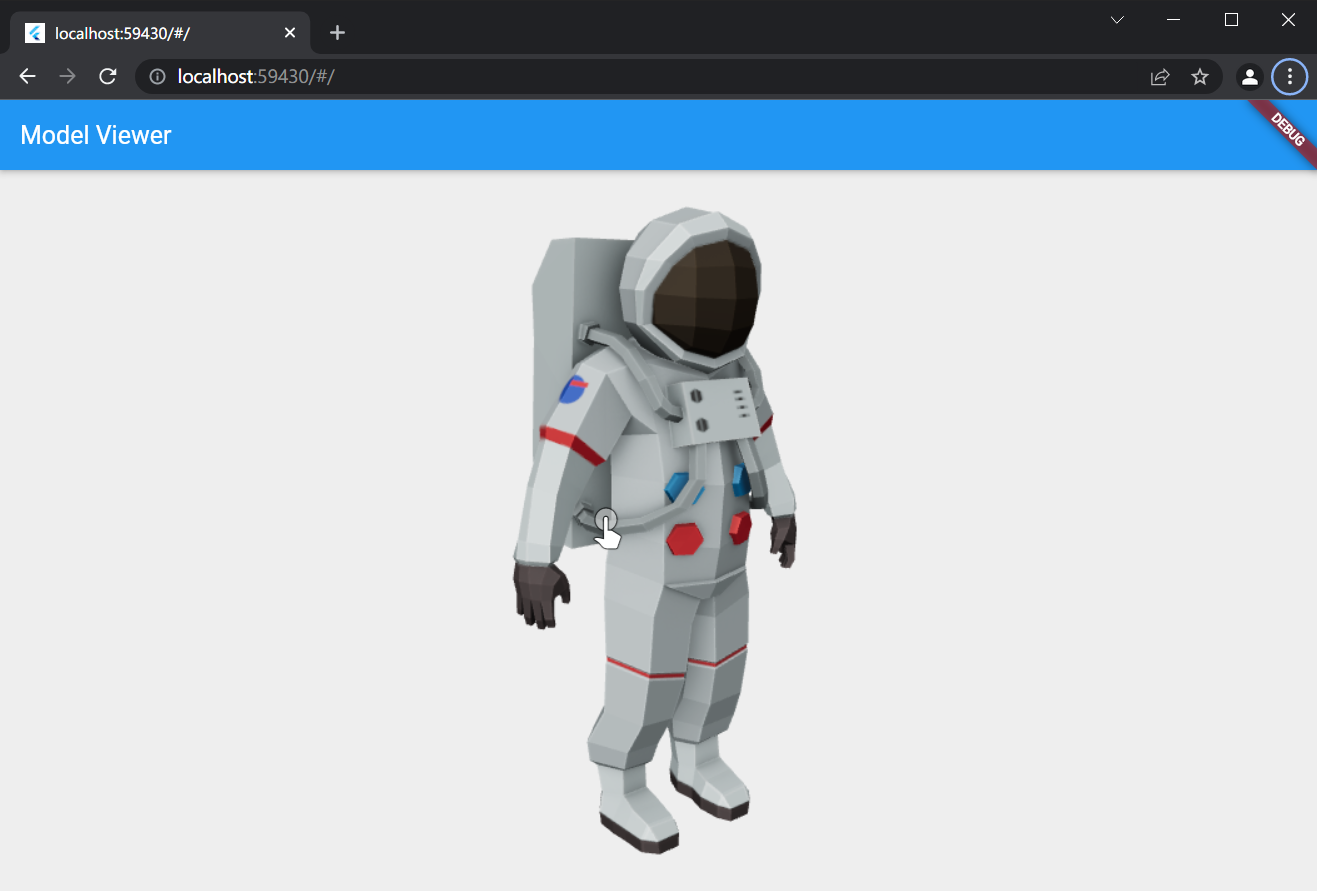https://pub.dev/packages/model_viewer - Fork from a package that is discontinued, and add the web support for it.
This is a Flutter widget for rendering interactive 3D models in the glTF and GLB formats.
The widget embeds Google's <model-viewer>
web component in a WebView.
- Android
- iOS (AR View may not avaliable on iOS 16+)
- Web, with a recent system browser version.
We use the Google APP, com.google.android.googlequicksearchbox to display interactive 3D models on Android. The model displays in 'ar_preferred' mode by default, Scene Viewer launches in AR native mode as the entry mode. If Google Play Services for AR (ARCore, com.google.ar.core) isn't present, Scene Viewer gracefully falls back to 3D mode as the entry mode.
dependencies:
model_viewer_plus: ^(newest from https://pub.dev/packages/model_viewer_plus)To use this widget on Android 9+ devices, your app must be permitted to make
an HTTP connection to http://localhost:XXXXX. Android 9 (API level 28)
changed the default for android:usesCleartextTraffic from true to
false, so you will need to configure your app's
android/app/src/main/AndroidManifest.xml as follows:
--- a/example/android/app/src/main/AndroidManifest.xml
+++ b/example/android/app/src/main/AndroidManifest.xml
@@ -8,7 +8,8 @@
<application
android:name="io.flutter.app.FlutterApplication"
android:label="model_viewer_example"
- android:icon="@mipmap/ic_launcher">
+ android:icon="@mipmap/ic_launcher"
+ android:usesCleartextTraffic="true">
<activity
android:name=".MainActivity"
android:launchMode="singleTop"This does not affect Android 8 and earlier. See #7 for more information.
Change minSdkVersion to 19.
defaultConfig {
// TODO: Specify your own unique Application ID (https://developer.android.com/studio/build/application-id.html).
applicationId "com.example.lab_rat"
minSdkVersion 19
targetSdkVersion flutter.targetSdkVersion
versionCode flutterVersionCode.toInteger()
versionName flutterVersionName
}
To use this widget on iOS, you need to opt-in to the embedded views preview
by adding a boolean property to your app's ios/Runner/Info.plist file, with
the key io.flutter.embedded_views_preview and the value YES:
<key>io.flutter.embedded_views_preview</key>
<true/>Modify the <head> tag of your web/index.html to load the JavaScript, like so:
<head>
<!-- Other stuff -->
<script type="module" src="./assets/packages/model_viewer_plus/assets/model-viewer.min.js" defer></script>
</head>./assets/packages/model_viewer_plus/assets/model-viewer.min.js will use the default js file which is included in this package's asset. The official site uses unpkg, by using https://unpkg.com/@google/model-viewer/dist/model-viewer.min.js, you are using the latest version of <model-viewier>. You may replace the
value of src attribute with another CDN mirror's URL. But please notice that our model-viewer-plus maybe not able to keep up with the <model-viewier>'s latest version.
According to #44, the render quality maybe low on some mobile devices. Please consider adding <meta name="viewport" content="width=device-width, initial-scale=1" /> to the <head> of your web/index.html.
-
Renders glTF and GLB models. (Also, USDZ models on iOS 12+.)
-
Supports animated models, with a configurable auto-play setting.
-
Optionally supports launching the model into an AR viewer.
-
Optionally auto-rotates the model, with a configurable delay.
-
Supports a configurable background color for the widget.
import 'package:model_viewer_plus/model_viewer_plus.dart';class MyApp extends StatelessWidget {
@override
Widget build(BuildContext context) {
return MaterialApp(
home: Scaffold(
appBar: AppBar(title: Text("Model Viewer")),
body: ModelViewer(
src: 'https://modelviewer.dev/shared-assets/models/Astronaut.glb',
alt: "A 3D model of an astronaut",
ar: true,
autoRotate: true,
cameraControls: true,
),
),
);
}
}class MyApp extends StatelessWidget {
// ...
src: 'assets/MyModel.glb',
// ...
}This is not avaliable on Web.
class MyApp extends StatelessWidget {
// ...
src: 'file:///path/to/MyModel.glb',
// ...
}class MyApp extends StatelessWidget {
// ...
src: 'https://modelviewer.dev/shared-assets/models/Astronaut.glb',
// ...
}Note that due to browsers' CORS security restrictions, the model file
must be served with a Access-Control-Allow-Origin: * HTTP header.
You didn't configure your AndroidManifest.xml as per the installation
instructions earlier in this document. See also #7.
A: Most likely, the platform browser version on your device or emulator is too old and does not support the features that Model Viewer needs.
For example, the stock Chrome version on the Android 10 emulator is too old and will display a blank screen; it must be upgraded from the Play Store in order to use this package. (The stock Chrome version on the Android 11 emulator works fine, however.) See google/model-viewer#1109.
A: There are several reasons why your model URL could fail to load and render:
-
It might not be possible to load the model URL due to CORS security restrictions. The server hosting the model file must send appropriate CORS response headers for Model Viewer to be able to load the file. See google/model-viewer#1015.
-
It might not be possible to parse the provided glTF or GLB file. Some tools can produce invalid files when exporting glTF. Always run your model files through the glTF Validator to check for this.
-
The platform browser might not support the features that Model Viewer needs. See google/model-viewer#1109.

